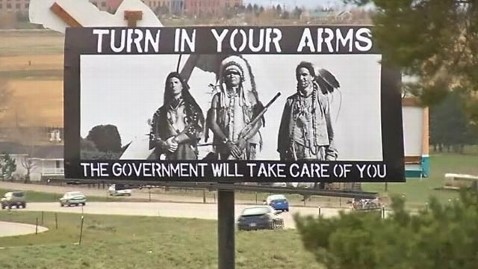Billboards Attacked for Using Native Americans to Argue Gun Rights
A pair of black-and-white, pro-gun billboards in Greeley, Colo., are amping up the anger in a state that recently passed gun control legislation that has Democratic lawmakers who voted for it threatened with recall elections and gun-related businesses threatening to move out in the legislation's wake.
The black-and-white signs feature three Native American men and read, "Turn in your arms. The government will take care of you."
The signs reportedly were paid for by gun advocates who wished to remain anonymous, Lamar Advertising account executive Matt Wells told the Greeley Tribune on Monday.
"I think it's a little bit extreme, of course, but I think people are really worried about their gun rights and what liberties are going to be taken away," Wells told the Greeley Tribune.
ABC News' calls to Lamar Advertising were not immediately returned.

KMGH/ABC News
Greeley, Colo., resident Maureen Brucker, 67, who is involved with Native American organizations, told ABC News she felt the billboards used the suffering of others to advance a political agenda.
"I have no comment one way or another about guns," Brucker said. "But I do have a comment about using Native American hardship to get a political point across, which is the same issue that I would have if someone used Holocaust imagery to get a political point across or Chinese railroad workers to get a political point across."
"It certainly gets the message across," Weld County Sheriff John Cooke told ABC affiliate KMGH. "I understand there are some Native Americans that are upset about it and I can see why, but you know, God bless America, it's freedom of speech and people have a right to put up offensive material."
The National Congress of American Indians was aware of the billboard, a spokesman said, and was "looking into the situation further."
Brucker, who is an honorary member of a family on the Pine Ridge Indian Reservation in South Dakota, said that people who paid for the signage lacked courage for failing to attach their names to the message.
"I think that's more of an issue in some ways than guns," she said. "It's a moral courage that needs to be spoken to, and along with that moral courage comes a respect for diversity of all kinds."
"You don't point out one different group and use it as an example to advance a majority culture issue," Brucker said.